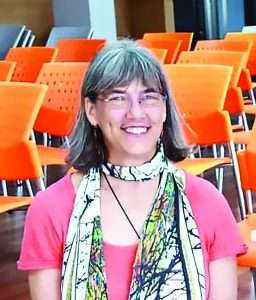While working toward her Ph.D. in anthropology at the University of Michigan, Sue Darlington planned to do her dissertation on the impacts of economic development in society.
But Darlington’s mentor Vira Somboon told her the idea was boring and typical.
“Everybody does that,” Somboon said.
Somboon then gave her the book Religion and Development by Thai Buddhist social activist Sulak Sivaraksa, which sparked Darlington’s interest in socially engaged Buddhism and essentially changed her life. Buddhist monks’ social actions became both Darlington’s dissertation topic and her subject for years of research.
At 2 p.m. Thursday in the Hall of Philosophy, Darlington will give a lecture titled “Interdependence, Impermanence and Buddhist Responses to the Environmental Crisis.” She will address whether different religious teachings support environmental activism, with a specific focus on Buddhism.

“We could just leave it at the philosophical level, and argue whether Buddhism is an environmental religion or not, but to me, that’s not the most important thing,” Darlington said. “The important thing is that [there are] Buddhists today who believe that these teachings provide the basis for action, and that they believe very strongly that as Buddhists they need to work to end suffering in the world — and that includes dealing with environmental issues that people struggle with.”
Darlington is an anthropologist who spent years studying Buddhist monks in Thailand who are motivated by Buddhist teachings to conduct environmental conservation and rural development projects. She is the author of The Ordination of a Tree: The Thai Buddhist Environmental Movement, and is most recently studying Buddhists in other countries across Asia.
Darlington is passionate about the anthropology, religion and environmental aspects of her work.
“I think it’s absolutely critical that we all be invested in [environmentalism],” Darlington said. “I think climate change is one of the biggest problems we’re facing and however people can find motivation to be aware and educated, and then act to try and make a difference, is critical.”
Darlington grew up with little religious focus or background. But she finds her lack of experience with the field makes her work more interesting and perspective more unique. As an anthropologist, Darlington works to understand how religion operates as a source of motivation for people.
“Because I really wasn’t raised religious, I find I really want to understand why and how religion is such a motivator,” Darlington said.
She said Buddhism was a great introduction to religious study because it is accessible, adaptable to many forms and its practitioners were open and willing to teach her about it when she arrived in Thailand.
“I didn’t have a context; I didn’t have any prior framework for which I was judging or looking at Buddhism, and I think that probably helped,” Darlington said. “I think everybody’s perspective is going to bring interesting, new ideas and different lenses, but for me that lens of not having a religious perspective was useful.”
Darlington’s anthropological perspective made her realize that although they contain some generalities, there is no “formula” for analyzing religious teachings because people interpret them in all different ways. Every world religion has served as a motivator for both acts of charity and terrorism.
“Every religious tradition has people do things that are negative in the name of their religion, and that’s the kind of motivator that needs to be countered,” Darlington said. “I think the majority of people do good based on the way that their religion speaks to them — but it’s a puzzle; there’s not one answer.”
But regardless of the various ways people in similar or different religious traditions interpret their faith, Darlington said, religion motivates them because “it’s something deeper than just intellectual knowledge.”
Darlington said religion provides a moral framework for people to both “make sense of the world” and “try to find a way through it.”
“A lot of the Buddhists do have something that we could translate as faith, but it’s not the equivalent [of what] that would mean in say, the Judeo-Christian tradition,” Darlington said. “But there’s something that people turn to that’s beyond themselves to help make sense of the world … [and] it’s something that provides a moral or an ethical framework.”




